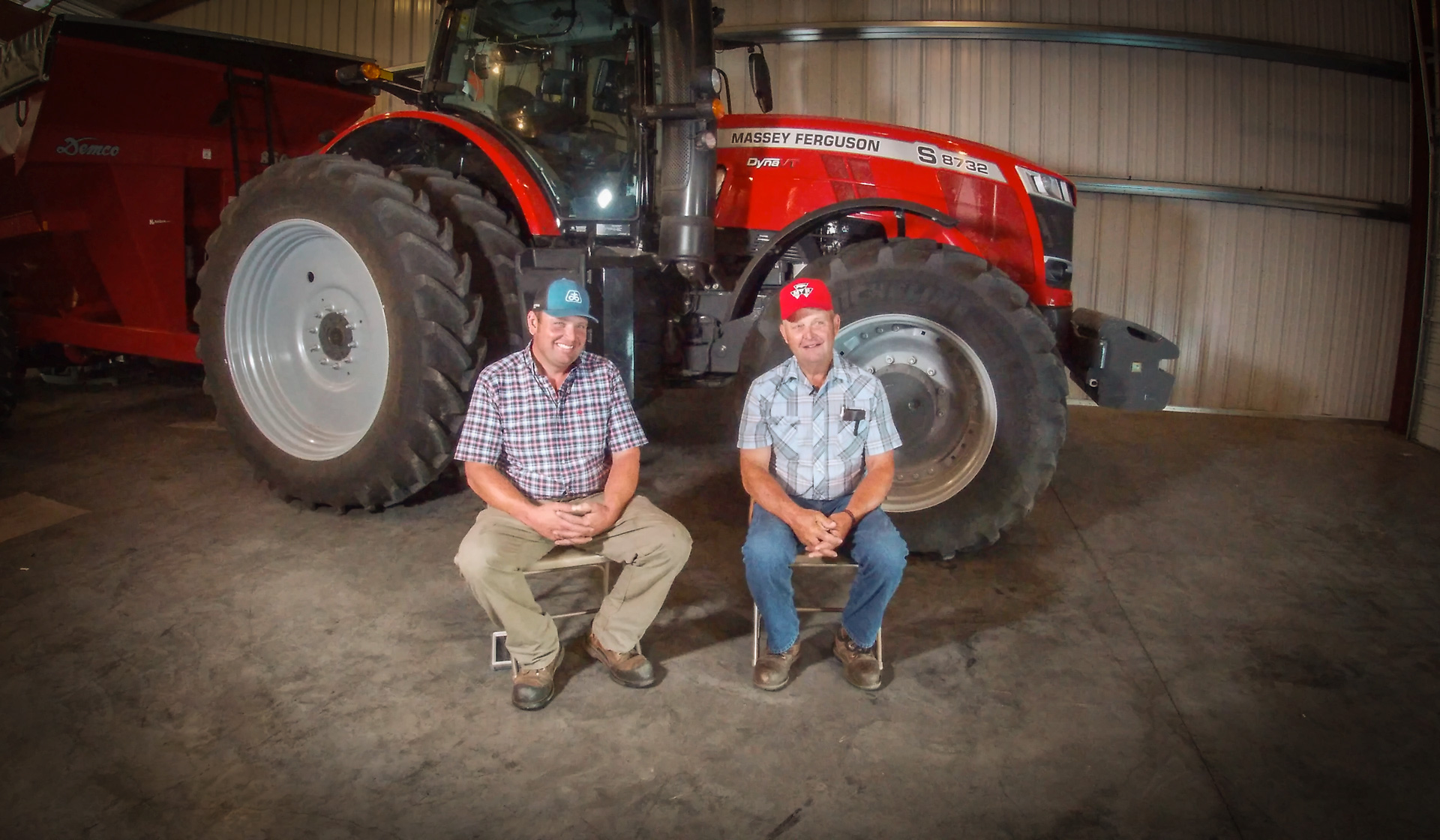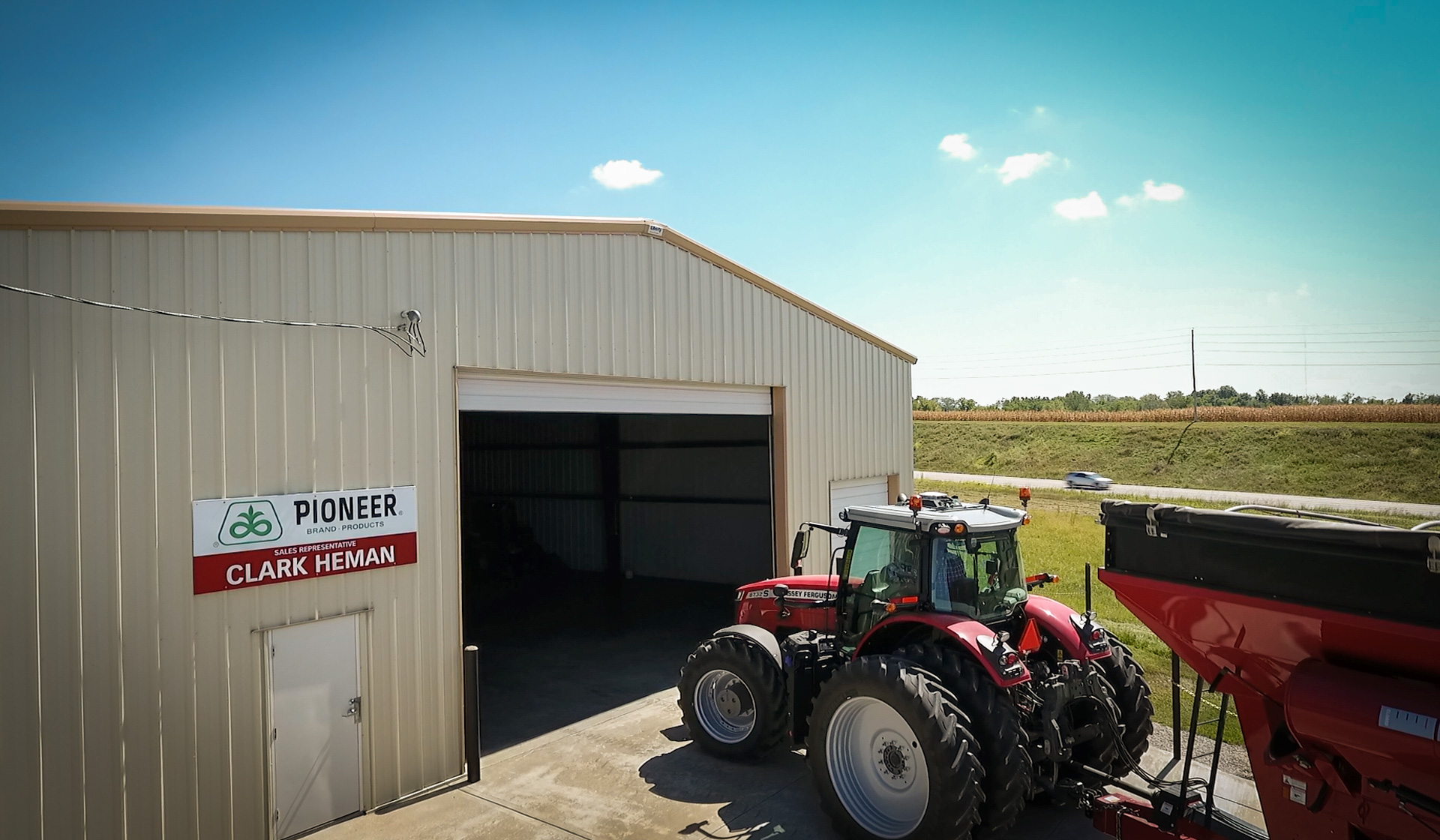Farming on the Curve
Doing things right, with 110% effort… that’s what is required to farm this rolling, river-bluff land. The Hemans have been doing it for decades.
By Jamie Cole | Photos By Jamie Cole
Ronnie Heman makes no bones at all about his farming philosophy. He and his sons, Clark and Travis, work land near Napoleon, Missouri, east of Kansas City, where there is some flat bottom land along the Missouri River. But most of their acreage is on slopes that curve and crest around river bluffs, a challenge to farm, unless you set it up right from the start.
“I had a high school teacher that taught me,” says Ronnie, sitting in the shop with son, Clark, who watches his dad recite his creed with a knowing grin. “A job worth doing is worth doing right. If you’re not going to do it right, then don’t bother to do it. Put 110% of your effort into it.
“I tried to live by that, and try to… what I do, do right,” he finishes emphatically.
Given that five generations have farmed in the Heman family, with a sixth in the wings, it’s likely that philosophy was in the bloodline before Ronnie heard it in the classroom. In fact, Ronnie says once he left high school, after watching his father farm while he grew up, there was nothing else he wanted to do. “That’s all I know. It’s a way of life. There’s nothing like it.”
Both of his sons share the “way of life” line of thinking, and have doubled up on farming as an occupation. While both work the family farm, they also work off-farm jobs that are still squarely in the industry. Clark went right from college into the seed business, today working as a sales rep for Pioneer. Travis started out of college as an equipment salesman, and then made a switch to farm real estate, working with Whitetail Properties.
For Clark, “having the opportunity to run the corn through the combine myself, run the beans through the combine myself, watch it grow on my own farm… I just feel like I can relate to my customers,” he says. “With beans, you’ve got to have good ‘harvestability’… They don’t stay green-stemmed and hard to cut. Corn, it’s got to stand, but dry down in a timely fashion. I farm with the products I’m selling, so I can relate to what my customers are dealing with.”
Still, he says no two years are the same, making his role as a seed rep crucial in helping other farmers make input decisions. “I am always looking for well-rounded products,” he says, noting that while tailored solutions from field to field are sometimes necessary, it’s also good to avoid constantly cleaning out the planter, “having a guy plant 10 different products just to have everything fine-tuned,” he says.
Travis watches for trends in his off-farm job as well, and says that while the farm real estate business isn’t “quite as wild as residential is right now,” it’s still very much a seller’s market, with all ranges of productivity in play. “We’re pretty diversified around here,” he says of the land market near Kansas City. “It’s not always just selling tillable land or just a recreational farm. It’s a combination, maybe tillable with some timber on it as well.”
There’s plenty of demand, he says. “Coronavirus hit and put doubt in a lot of people’s minds about the stock market,” Travis says. “Land may not be the fastest way to grow investments, but it’s historically one of the safest places to put it. Plus, you can go out and hunt, ride four wheelers, take your family… And if it’s 50% tillable and 50% timber, you get the value going up and some income off of it as you go, too.”
For farmland, Travis says buyers are looking for something they don’t have to “pump a lot of money into… terraced, tiled and ready to go,” he says.
That’s something the Heman family can certainly relate to. The family has spent decades investing in conservation practices, particularly terracing and tiling. Farming on the curves “takes longer… but it sure helps conserve soil,” says Clark, who says the family prefers not to see “nutrients we pay dearly for” wash away. Mowing and maintaining waterways takes time, too, keeping Clark busy all summer, but it’s worth it in the end.
“We try to do things right,” Ronnie reiterates, “and one of those things would be farming the ground correctly to conserve soil, trying to do contour farming and make the minimum amount of erosion possible,” he says. And, he adds, “this past year, all but one or two of our fields was no-till. Conservation will save you money in the long run because you keep the topsoil where it was.” Again, it’s in the bloodline; Ronnie’s father, Clark and Travis’ grandfather, “was Conservation Farmer of the Year more than once,” says Clark.
You don’t do that kind of work without having the next generation in mind. Travis and Clark both have three kids, each. Are they interested in farming? “Well, they’re young, so they’re interested in everything right now,” Clark laughs. The family maintains a small beef herd, and Travis adds that his kids are already planning how many big-rig pot trucks they’re going to own.
Sounds promising. Ronnie hopes they catch on, like his dad did from his grandfather, and like Clark and Travis did from him. “There’s nothing like family farming just going down through the generations,” Ronnie says. The grandsons “can tell you all you want to know about farming and they’ve been around it and enjoy it very much,” he says. Sounds like they’re on board with the philosophy of doing things right? “Hopefully, someday, they’ll just fall in line,” he says, with a smile.
Related Articles
Massey Ferguson Fits the Farm-It-Right Philosophy

Doing things right takes more work, more time… but the right tractor can help keep it all efficient.
Read MoreNew Video From Fendt
Check out the new YouTube channel from Fendt, featuring FarmLife customer stories, equipment walkarounds, how-to content and more!
View It Now
Check out the new YouTube channel from Fendt, featuring FarmLife customer stories, equipment walkarounds, how-to content and more!
View It Now







